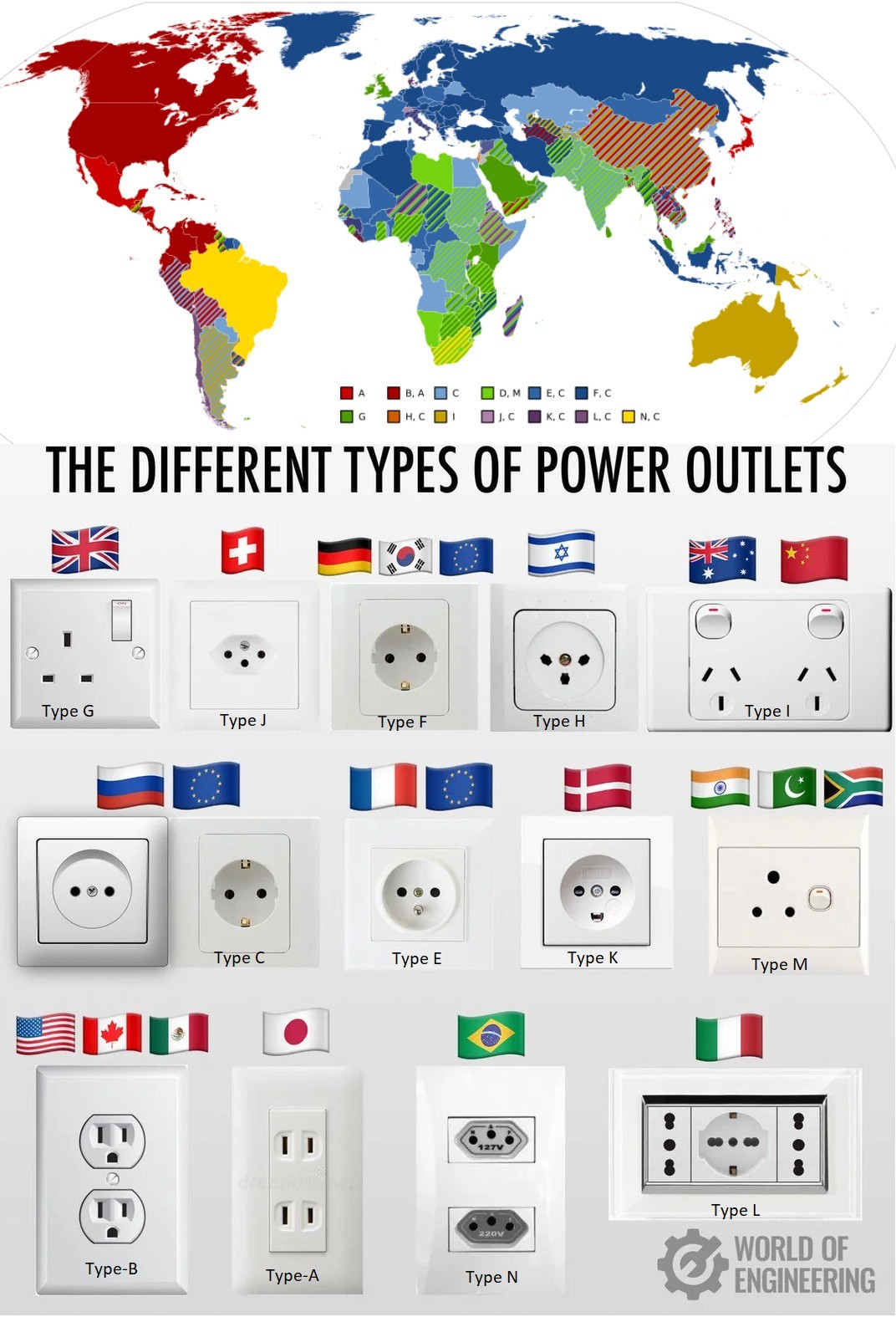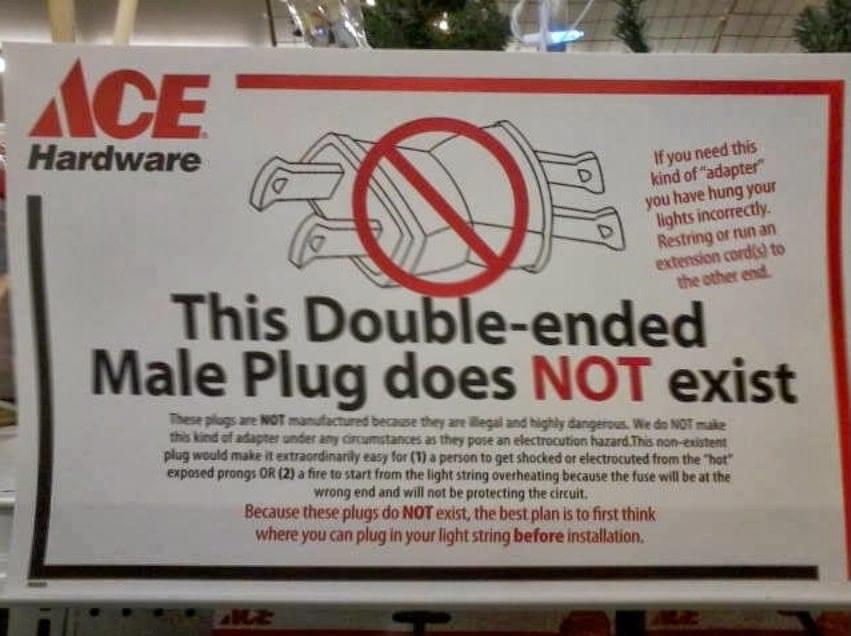What is the best Power Outlet, and why?
-
Fuses mean protection is localised. If the socket is good for 13A, but the cable is only safe to 5A, you can fuse at 3A or 5A, and know it's safe.
This is partially useful for extension leads. We don't have to worry about overloading a multiway extension. If we do, it will pop a 10p fuse, rather than cause a house fire.
Are you really going to change the fuse in the receptacle when you plug a different cable in?
Low amp rated extension cords are dangerous unless they have a fuse in the cable. Best practice is to always use a cable that is rated higher than the circuit breakers.
-
Are you really going to change the fuse in the receptacle when you plug a different cable in?
Low amp rated extension cords are dangerous unless they have a fuse in the cable. Best practice is to always use a cable that is rated higher than the circuit breakers.
The fuse is in the plug itself. It goes with the cable. That's the point of it!
 It lets you down rate your cables from the breaker rating.
It lets you down rate your cables from the breaker rating. -
The safest ones (design-wise) would be the ones that are inset, like types C, E, F, H, J, and K. If there is ever a chance a plug is partially pulled out or not fully inserted, the socket being inset wouldn't allow anything to touch any of the contacts.
Fuses in plugs and the orientation are relatively irrelevant to the plug style and are more a convention choice, if not regulatory requirement.
Doesn't G have an insulated portion so live conductor is never exposed?
-
Type K looks the happiest.
Type I looks the hauntedest.And type B just realized how insecure it is.
-
A useful source:
https://worldofsockets.comClearly type K. It's such a happy lil guy
-
And type B just realized how insecure it is.
It should be. after all: We Americans only use the shittiest of infrastructure. USA USA



-
Doesn't G have an insulated portion so live conductor is never exposed?
Yes G, the UK one, is generally regarded as the safest.
This showcase also doesn't show that UK sockets have flaps come down on the interior of the socket, so unless the longer and shielded earth pin is pushed in first, the flaps exposing live and neutral won't raise.
-
A simple lamp can demonstrate.
You have both live and neutral lines in the cable, coming up to a switch, which can either open the circuit on the live line or the neutral line. Then, the lamp itself has a single light bulb as the load.
If you place the switch on the live line, then the energy of the live line stops at the switch, with only whatever lower voltage is in the neutral line to actually be connected to the light bulb and lamp assembly.
But if you place the switch on the neutral line, you're leaving the entire lamp on the voltage of the live line, which gives the voltage more places to potentially short circuit. If you were to take a non-contact voltage detector, you'd be able to detect a live voltage in the line leading up to the bulb, even when it's not turned on.
You generally do this with the in-wall wiring and switches, too, and make the wall switches break open the circuit on the live line, not the neutral line. It's just a better practice overall.
And no, the neutral line is not totally grounded, so it can still pose a danger, too. But safety is exercised in layers, and putting the switch on the live line is the better practice.
If there's electricity reaching the bulb it would be lit no?
So if I place the contact upside down, I wouldn't be able to turn off my light? -
A useful source:
https://worldofsockets.comDoes Japan / type-A not have grounded circuits?
-
These shocks are almost always to a single finger.
The shocks people walk away from, sure.
-
This is entirely an US problem created by the "center tap" nonsense. Nobody else I'm aware of uses that, let alone with that other. The outlet in question (type F) I'm only aware of being in use with one phase of a there phase supply plus the neutral, or just "the" phase and neutral. Note that in the second case, even if a house or apartment only has one phase wired to it, it's still generally part of a three phase supply, but the other phases just aren't wired to that particular place (incredibly rare these days, but might be the case for very old homes/installations).
Now the real reason for it being safe: The neutral is required to be wired to ground at the main breaker panel. With installations newer than 2000-something, every circuit has to be GFCI protected. With even newer installations having even more granular requirements (not sure on the specifics).
in many flats even recently built you don't get three-phase power, just single phase, but building divides single three-phase supply into three groups of single phase circuits like you say (do you really need 20kW in residential flat? one that doesn't use EV charger, built in 90s-10s?) i guess it depends on country also. separate houses tend to get three phase connection where i live
floating neutral will also be a problem in american-type two-phase installation, might be even worse (more frequent) on account of large number of lightly maintained transformers used (why on gods green earth there's few-kV medium voltage line going down every street, americans make it make sense)
-
The safest ones (design-wise) would be the ones that are inset, like types C, E, F, H, J, and K. If there is ever a chance a plug is partially pulled out or not fully inserted, the socket being inset wouldn't allow anything to touch any of the contacts.
Fuses in plugs and the orientation are relatively irrelevant to the plug style and are more a convention choice, if not regulatory requirement.
The British plug serves the same point as an inset because there's a bit of non-conductive material on the plug itself that goes into the wall. If it's not fully inserted then the only thing showing is the non-conductive material.
It also has the thickest metal on the plug as far as I know. It's probably the only thing that the British have ever engineered better than the Germans.
-
Don't a bunch of them, like I, have an earth pin?
You have an earth pin?
-
In my opinion it's Type-F
Because:
- It's bi-directional
- It's grounded and ungrounded plugs use the same socket
- It's already widespread (50+ countries) source
- Your fingers can't touch the live wire as you're plugging in a wire
- It's recessed
- Low footprint
- Accepts Type-C
Furthermore, appliances compatible with Type F are almost always compatible with Type E as well, it's just a matter of including both grounding mechanisms which they all do to avoid designing multiple cords.
I haven't yet visited the UK so the only time I've had trouble plugging in something in Europe is in shudders Italy.
-
A useful source:
https://worldofsockets.comG.
The plugs are shuttered, so they're protected from being stabby-stabbed. The plug's prongs are sheathed so live metal is never exposed, negating the need for recessed sockets. Compared to recessed plugs, it takes less force to insert/remove them, but the oversized prongs and their triangular arrangement means it can safely withstand more lateral stress than any other plugs. Every plug has a fuse appropriate to the appliance so every device has appropriate protection while also allowing any device to be used on any outlet - no need for dedicated outlets for tumble dryers. And the plugs are traditionally right-angled, so once they're plugged in they only protrude about a centimeter, making it easy to plug things in behind furniture.
The whole 'every plug has a switch' thing is bullshit, though. That's just weird.
-
In my opinion it's Type-F
Because:
- It's bi-directional
- It's grounded and ungrounded plugs use the same socket
- It's already widespread (50+ countries) source
- Your fingers can't touch the live wire as you're plugging in a wire
- It's recessed
- Low footprint
- Accepts Type-C
Hear me out, type L, the one in the middle, is the best socket, as it has all the things you talked about, but also accepts Italian plugs.
Type L bipasso (the one on the side) instead is the most space efficient, while retaining type C compatibility and grounding. Type L plugs also have plastic bits at the end to avoid contact with live wire (like UK one).
-
If there's electricity reaching the bulb it would be lit no?
So if I place the contact upside down, I wouldn't be able to turn off my light?It's not electricity, exactly, but it is a higher voltage that is different from the average of everything around it. Electricity needs a closed loop to flow, and breaking open the loop with a switch means that no electricity flows, but the voltage of the live line goes up and down, creating an electric potential with anything that might be at a different voltage, if a conductor touches both.
-
The Europlug is designed to be compatible with [Types C, E, F, and K]
Another sweeping win for Europ(e)lug!
-
I declare RJ45 and USB C everything! But for big boi power….. no clue.
Obviously you take a page out of gaming laptops books and just plug in more USB C cables for more power! You now need 4 USB C cables to power that toaster. And your stove? 12 of them should do!
-
Damn homophobes...




